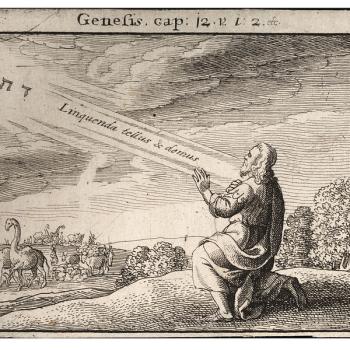
Today marks the second Sunday of Advent. Advent is all about waiting, and waiting often involves mixed emotions. Waiting is so hard to do in any season of life, and in any age. Perhaps it is most difficult today in an instant gratification culture, where “we want the world, and we want it now” (Jim Morrison, lyrics to “When the Music’s Over,” The Doors). No matter how young or how old, it is difficult to wait and cope with mixed emotions. This post recounts the events surrounding John the Baptist’s birth, the mixed emotions associated with it, and its bearing on our lives today.
Proverbs reflects on mixed emotions related to waiting: “Hope deferred makes the heart sick, but a longing fulfilled is a tree of life.” (Proverbs 13:12; NIV) I can’t help but think mixed emotions filled the hearts and minds of Zechariah and Elizabeth and the people of Israel, as recorded in Luke chapter 1.
Zechariah was a priest and Elizabeth was his wife. They were both descendants of Aaron, and Elizabeth was Mary’s cousin. They were old and gray and had no children. The account reads: “Both of them were righteous in the sight of God, observing all the Lord’s commands and decrees blamelessly. But they were childless because Elizabeth was not able to conceive, and they were both very old.” (Luke 1:6-7; NIV)
Luke 1 recounts that Zechariah was chosen by lot to go into the temple to burn incense. An angel appeared and declared to him that his wife Elizabeth would give birth to a son, who would be a prophet who would bring many people back to God. Zechariah was dumbfounded and filled with disbelief given he and Elizabeth were an elderly couple. The angel shut Zechariah’s mouth so he could not speak until the child’s birth, which would take place at the appointed time.
It must have been extremely difficult for Zechariah to be forced into silence throughout his wife’s pregnancy. The sense of expectation must have been bursting inside him. For her part, Elizabeth said that God had taken away her “disgrace” upon realizing she was pregnant. The account reads that when Zechariah’s “time of service was completed, he returned home. After this his wife Elizabeth became pregnant and for five months remained in seclusion. ‘The Lord has done this for me,’ she said. ‘In these days he has shown his favor and taken away my disgrace among the people.’” (Luke 2:23-25; NIV)
Zechariah and Elizabeth longed to have a child. Zechariah longed to speak again. Israel longed for God’s Messiah to come. At the birth of their son, Zechariah was able to speak again, when he informed those gathered in writing that the child’s name was to be John, as the angel declared. With longing fulfilled, Zechariah rejoiced in God. God had remembered his covenant promise to Abraham and would rescue his people from their enemies (Luke 1:73-74). Zechariah closes his song of praise and thanks with these words:
And you, my child, will be called a prophet of the Most High;
for you will go on before the Lord to prepare the way for him,
to give his people the knowledge of salvation
through the forgiveness of their sins,
because of the tender mercy of our God,
by which the rising sun will come to us from heaven
to shine on those living in darkness
and in the shadow of death,
to guide our feet into the path of peace. (Luke 1:76-79; NIV)
Zechariah and Elizabeth’s son, John the Baptist, would prepare the way for the Lord, the Messiah. But many years would pass before he would begin the work for which he was born. So, more waiting was in store for Zechariah’s family. Their account closes with these words about Zechariah’s and Elizabeth’s child: “And the child grew and became strong in spirit; and he lived in the wilderness until he appeared publicly to Israel” (Luke 1:80; NIV).
Just like John the Baptist and his parents, waiting marks God’s people’s lives throughout the ages. If we take a close look at our emotional lives, we might find that we are filled with mixed emotions: “hope deferred makes the heart sick, but a longing fulfilled is a tree of life.” (Proverbs 13:12; NIV)
My wife and I prayed for several years before God granted us our firstborn child, Christopher, on November 19, 1995. We experienced mixed emotions over those years, and during the pregnancy. But nothing could prepare us for the mixture of emotions we have endured since Christopher’s catastrophic brain injury in January 2021. To be honest, there is more hope deferred these past three years than longing fulfilled.
I endured mixed emotions the other day when a well-meaning, inquisitive student asked me why we haven’t pulled the plug on Christopher after nearly three years of hoping and waiting. In response, I gave three reasons: first, he is minimally conscious; second, we were told by a neurologist that he believes Christopher will attain a meaningful quality of life, though it could take years (also noting that statistical accounts of TBI were historically flawed in terms of the timeframe for recovery); and third, he is our son.
I shared this conversation and my reasoning with our palliative care specialist advisor and medical ethicist, Dr. Robert Potter (M.D., Ph.D.), who concurred with my reasoning. Of course, we do not know the future, and we endure so many ups and downs every given week. But we keep pressing forward with mixed emotions.
We go from one day when Christopher doesn’t show any signs of responsiveness in our presence to the following day when he will smile and apparently try to speak. Just yesterday, his nurse reported at his bedside to me that Christopher was listening to a comedy skit earlier in the morning and was smiling in response to the humor. She also shared that Christopher didn’t like it when she gave him his eyedrops. You could tell by the look on his face that he was listening attentively to her. Without missing a beat, he gave a big sigh of protest when she recounted the ordeal with the eyedrops. (my son hates receiving those drops four times a day). We chuckled heartily, though empathically.
Even my son experiences mixed emotions in his minimally conscious state. Together with his parents, we endure the range of fervent feelings. Every day that we see no sign of progress makes our hearts sick. Every day that we observe signs of consciousness and progress is like a tree inside our spirits blossoming with life.
So much of life is about waiting. The Bible does not ignore this reality. If anything, it prepares us for it and frames our expectations so that we keep going, keep moving forward with mixed emotions. As we await Jesus’ coming at Advent, we join the patriarch Abraham (recounted last week), as well as Zechariah, Elizabeth, and John the Baptist. We join with people across time and space who do not cater to instant gratification but settle in for the long haul. Do not pull the plug on faith. No matter the wide range of mixed emotions, I really do believe that hoping fervently for Jesus to come and make all things new is worth the wait.
PS: Here is a new recording of a live webinar that Byron Borger of Hearts & Minds Books and I did just prior to Advent and the new Christian liturgical year. Many thanks to Byron, as well as to Michael Thomson of Wipf & Stock Publishers, who hosted the event. The event featured my book, Setting the Spiritual Clock: Sacred Time Breaking Through the Secular Eclipse (Cascade, 2020). It is part of their Worship & Witness series edited by the Calvin Institute of Christian Worship.














